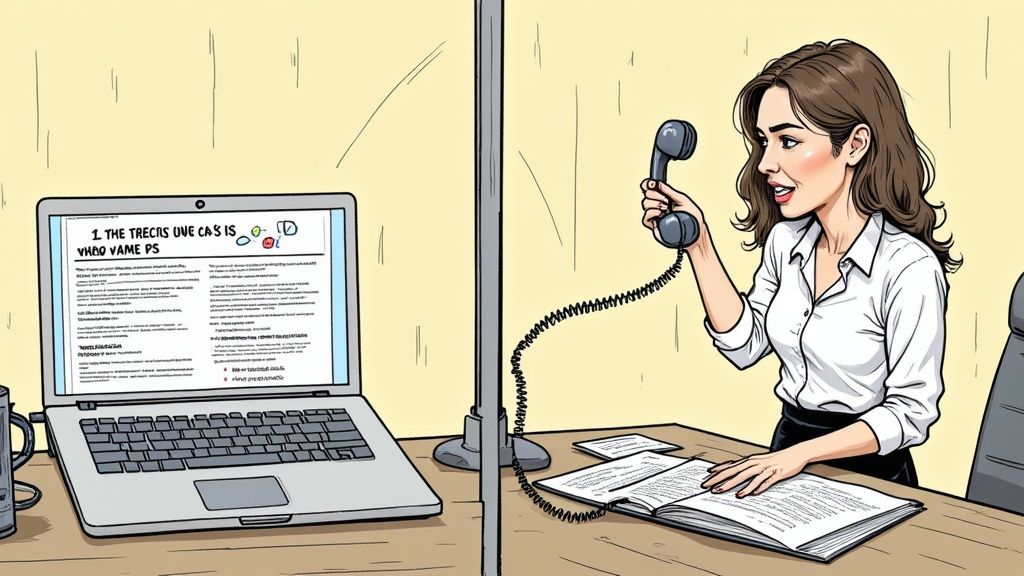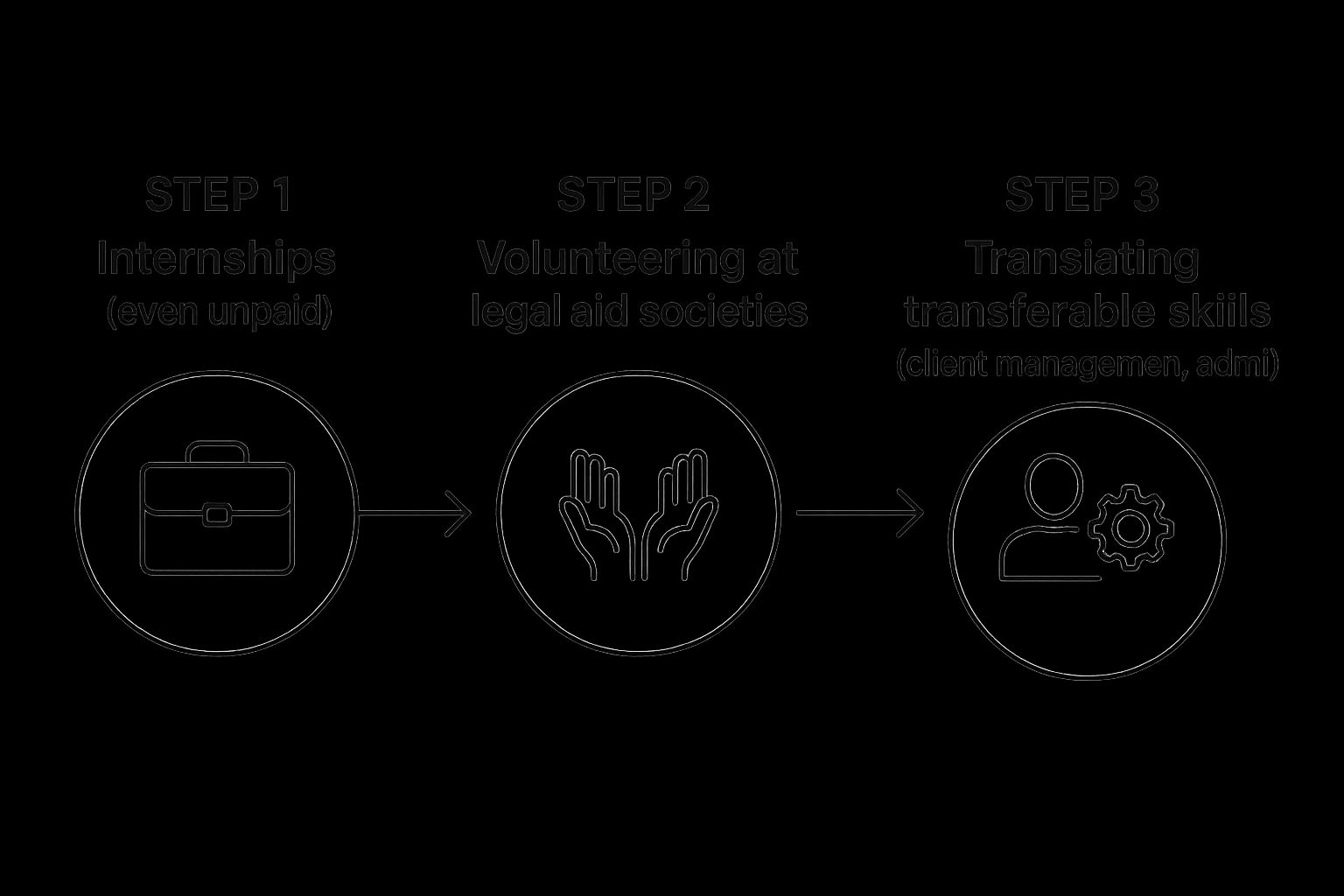
 16 minutes read
16 minutes read
Forget the Hollywood courtroom drama. The real requirements for paralegal jobs are less about fiery objections and more about being the indispensable, hyper-organized backbone of a legal team. I'm talking about the kind of person who finds a weird sense of satisfaction in turning a mountain of chaos into a perfectly ordered case file.
So, you think you have what it takes? Let's cut the fluff. Landing a paralegal role is about a specific mix of formal education, the right certifications, and a set of skills you definitely can't learn from a textbook.
Think of this as your boot camp briefing. We're going to break down the core requirements for paralegal jobs so you can stop guessing and start building a real career path.
Let's get one thing straight: becoming a paralegal isn’t just about being "good with paperwork." It’s about being the person an attorney trusts to manage the details that win cases. You’re the operational engine that keeps the firm running, not just a glorified assistant. Hope you enjoy being the smartest person in the room who doesn't get to give the closing argument.
This role has exploded in importance. And the numbers don't lie. According to the Bureau of Labor Statistics, employment for paralegals is projected to grow by 4% from 2022 to 2032, which is faster than the average for all occupations.
That translates to about 38,700 job openings projected each year. To see the full picture, you can find a more detailed breakdown of these paralegal job market trends.

The bottom line is this: firms are desperate for competent paralegals. They’re no longer a luxury; they’re a necessity for any practice that wants to operate profitably. Your job is to prove you’re not just another resume in the pile.
Ready? Let's get into the nitty-gritty.

Before we unpack each component, here’s a quick-and-dirty overview. Think of these as the non-negotiables that make hiring managers sit up and take notice.
| Requirement Category | Why It Matters (The Real Reason) | What to Expect |
|---|---|---|
| Education | Provides the legal foundation so you don't sound like you learned law from a TV show. | Associate's, Bachelor's, or Post-Baccalaureate Certificate in Paralegal Studies. |
| Certifications | Proves you’re committed, not just dipping your toes in the legal field. A solid hiring advantage. | NALA's CP, NALS's PP, or NFPA's RP credentials. |
| Technical Skills | These are the tools of the trade. Inefficiency here costs the firm money, which costs you your job. | Proficiency in case management software, e-discovery tools, and legal research databases. |
| Soft Skills | This is how you manage panicking clients, collaborate with stressed-out attorneys, and handle pressure. | Strong communication, organization, critical thinking, and empathy. |
| Experience | Practical application is where theory gets a reality check. Internships are your golden ticket. | Ranges from internships for newcomers to 5+ years for senior or specialized roles. |
| Remote-Work Fit | Proves you can be a self-starter without someone looking over your shoulder. | Tech-savviness, excellent time management, and proactive communication. |
This table is the 30,000-foot view. Now, let’s dive into what each of these really means.
Alright, let's settle the great education debate. Do you need a four-year bachelor's degree, a two-year associate's, or can you just snag a quick certificate and call it a day?
The truth is, it depends. But don't worry, I’m not here to give you a vague, lawyerly answer. I’m here to give you the inside track on what actually moves the needle with hiring managers who've seen it all.
Think of your education less like collecting diplomas and more like a strategic investment. A bachelor’s degree in paralegal studies might be the golden ticket for a cushy gig at a massive corporate firm. On the other hand, an ABA-approved certificate could be your fastest route into a scrappy boutique practice where you'll get real-deal experience from day one.
Here’s the deal: not all paralegal programs are created equal. You’re going to see a million online ads for quick, cheap certificates. Ignore them.
If a program isn't approved by the American Bar Association (ABA), it might as well be written on a napkin.
Why the fuss? ABA approval is the industry's quality control. It tells a law firm that you've been through a program with rigorous standards and a relevant curriculum. Showing up with a degree from a non-approved program is like trying to pay for groceries with Monopoly money. It just doesn’t work.
This isn't just my opinion; it’s the standard. With the legal field getting more competitive, you need every advantage you can get. Don't start your career with a handicap.
So, what’s the right move for you? Let's break down the options without the glossy brochure fluff.

Ultimately, your education is your opening argument. A bachelor’s degree says, “I’m invested for the long haul,” while a targeted, ABA-approved certificate says, “I’m specialized and ready to work right now.” Choose the one that tells the story you want to tell.
Okay, you've got the piece of paper. Congratulations. Now, let’s talk about what actually makes you useful. Your diploma gets you the interview; your skills get you the job—and keep you from getting replaced by a surprisingly confident but utterly wrong AI.
We're splitting this into two camps. Hard skills are your technical toolkit. Soft skills are the secret sauce—the grit, communication prowess, and almost psychic ability to anticipate an attorney's needs. A perfect GPA is nice, but firms are really looking for someone who won't crumble when three deadlines land at once.

This is the "can you actually do the work?" part of the test. These aren't suggestions; they’re the baseline requirements for any modern firm. Hope you enjoy learning new software, because that’s now part of the job.
Legal Research Prowess: You need to be a wizard with databases like Westlaw, LexisNexis, and Bloomberg Law. It’s not about finding an answer; it’s about finding the right answer, quickly and cost-effectively.
Tech-Savviness: Proficiency in Microsoft Office is assumed, not a skill. The real value is mastering case management software (think Clio, MyCase, or Filevine) and eDiscovery platforms. If you can navigate a complex document review, you're already ahead.
Impeccable Writing and Drafting: Can you draft a motion or a discovery request without an attorney having to rewrite the whole thing? Your ability to produce clean, precise, and legally sound documents is your most tangible output.
These skills are your ticket to entry. Mastering them is the first step when you’re figuring out how to successfully work as a paralegal.
Here’s where career paralegals separate themselves from the short-timers. You can teach someone how to use a research database. You can’t easily teach them to have common sense under pressure.
These are the traits that don’t show up on a transcript but make all the difference.

A paralegal’s true value isn't just in what they know, but in how they think. They’re the ones who spot inconsistencies AI would miss, manage chaotic client communications, and provide the irreplaceable human judgment that technology can't replicate.
Think of it this way: hard skills are the engine, but soft skills are the steering wheel. Without them, you're just going to crash, expensively.
Key Soft Skills Hiring Managers Crave
Organizational Genius: This is more than a tidy desk. It’s about managing complex calendars, tracking hundreds of documents, and creating systems that turn chaos into order. You are the firm’s human operating system.
Anticipatory Thinking: The best paralegals don’t wait to be told what to do. They see a deposition is scheduled and start preparing the exhibit binders. It’s about being two steps ahead, always.
Unflappable Communication: Can you draft a client email that is both empathetic and legally precise? Can you chase down a partner for a signature without being annoying? This blend of tact and persistence is an art form.
Problem-Solving Grit: Things go wrong. Documents get lost, deadlines shift. Your job is to find a solution, not just point out the problem. This is where you prove you’re more than a task-doer; you’re a problem-solver.
If you think being a paralegal is still about dusty law books and paper files, it’s time for a reality check. The legal world has gone digital, and your ability to master its tech isn't just a "nice-to-have" skill—it's a core requirement. Listing "proficient in Microsoft Word" on your resume is like bragging you know how to use a fork. The bar is much higher.

So, what does this new tech stack actually look like? The modern paralegal is expected to be a power user across a whole suite of specialized tools.
You need to be fluent in legal case management software. Think of these platforms as the central nervous system for the entire practice. Not knowing your way around them is a major red flag. To get up to speed, take a look at our guide on the best legal case management software and get familiar with the industry leaders.
Beyond that, true tech proficiency means being comfortable with:
The rise of AI in the legal field isn't about replacing paralegals. It’s about replacing the tedious, repetitive parts of the job a machine can do faster, like initial document review or summarizing deposition transcripts. The paralegals who will succeed are the ones who learn to supervise these AI tools, not compete against them.

A recent Robert Half report highlights a fiercely competitive job market, with paralegal unemployment at just 1.9%. This same report notes that the integration of AI is pushing firms to find candidates skilled in tech-heavy tasks like eDiscovery and data privacy.
Firms aren't just looking for someone to file motions anymore. They're looking for an operator who can manage the digital infrastructure of modern legal work. Your job is to become that operator.
It's the classic catch-22, isn't it? Every entry-level paralegal job posting seems to demand one to three years of experience. So, how do you get that experience if you need it just to get in the door?
Forget shotgunning your resume everywhere. That's not a strategy. You need to be deliberate and a little creative to build a resume that shows you're ready, even if you're just starting out.
First, get your hands dirty. Find work that law firms actually value, even if it doesn't come with a big paycheck.
Targeted Internships: Go after internships at small to mid-sized firms. You’re much more likely to get hands-on experience there instead of just fetching coffee. An unpaid internship might sting, but if it gives you real tasks to put on your resume, it’s a golden ticket.
Volunteer at a Legal Aid Society: These organizations are almost always understaffed and swamped. They will happily put your skills to work on real cases with real clients. This is practical, on-the-ground training that hiring managers truly respect.
This simple workflow shows how you can build a strong foundation, starting with practical experience before you even touch your resume.

Following this path shows a clear progression from gaining legal exposure to leveraging what you already know, turning you into a much more compelling candidate.
Now, let's look at the experience you already have. It's time to reframe it. Stop focusing on your old job titles and start thinking about the skills you used.
That retail job where you handled demanding customers? That wasn't just retail—that was client management and conflict de-escalation.
That administrative assistant role where you managed three executives' chaotic schedules? That wasn't just scheduling—that was case administration and deadline management.

It’s all about the spin. You have to connect the dots for the hiring manager. Show them how your past experiences, even if they weren't in a law firm, prepared you for the core demands of a paralegal role: organization, communication, and problem-solving under pressure.
Don't just list your old duties. Translate them into the language of a law firm. This isn't about being dishonest; it's about confidently showcasing your transferable skills.
We've covered a lot of ground. Now, let's put it all together into a practical action plan. Think of this as your roadmap for meeting the requirements of a paralegal job.
Let's be clear: this path isn't a walk in the park, but it is absolutely doable. Your success will come down to your drive and your ability to show you’re the most organized, dependable person they’ll ever meet. It’s time to move from planning to doing.
This is all about laying the groundwork. Don't cut corners here.
Get the Right Education: Enroll in an ABA-approved paralegal program. Whether you choose an associate's, a bachelor's, or a post-baccalaureate certificate, this is the non-negotiable first step.
Land an Internship: Start looking for opportunities at a small firm or a local legal aid society. I can't stress this enough: practical experience is far more valuable than a perfect GPA. This is where you connect classroom theory to the real world.
With a solid foundation, it’s time to find your niche.

Don't stay a generalist for too long. The real key to increasing your value—and your salary—is to specialize in a high-demand area like intellectual property, litigation, or corporate law. Find a practice area that genuinely sparks your interest.
Once you’ve chosen a path, focus your continuing education and job applications on that specialty. Dive deep into the specific software, procedures, and terminology that go with it. This is how you stop being just another paralegal and become an essential part of the team.
Alright, let's tackle some of the most common questions people have. Here are the straight-up answers you need.
A certificate on its own can be a tough sell, especially if it's from some random online program. Law firms see that as a potential shortcut.
The real power move? Earning a certificate from a respected, ABA-approved program after you've completed a bachelor's degree. That combination is golden. It tells hiring managers you have both a solid academic foundation and the specific legal training they're looking for.
Definitely not. In fact, locking yourself into a specialty too early can be a mistake.
You might be drawn to the high-stakes world of litigation, but find yourself miserable after sifting through your fifth box of discovery documents. You might write off corporate law as boring, only to discover that your knack for organization makes you a natural at transactional work.
The best approach is to get some real-world exposure first. An internship at a general practice firm is the perfect way to test the waters before you specialize.
It’s everything. And I'm not talking about cheesy cocktail hours. The legal community is surprisingly small, and your professional reputation follows you everywhere.
Here’s the inside track: many of the best paralegal positions never even make it to a job board. They’re filled through word-of-mouth, based on referrals from trusted colleagues.

Your network is one of your most valuable career assets. Joining local paralegal associations and making a good impression during an internship can lead directly to a job offer. It's not just who you know, it's who's willing to vouch for you.
Ready to stop searching and start hiring? HireParalegals offers a pre-vetted network of over 10,000 experienced legal professionals, letting you find the perfect remote paralegal in as little as 24 hours while cutting payroll costs. Find your next great hire.